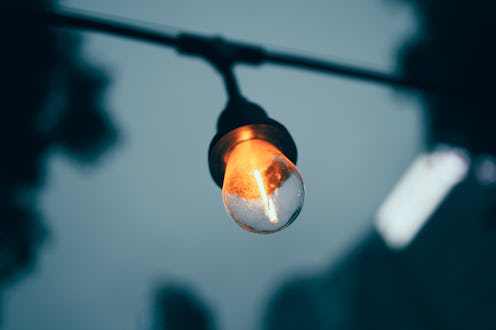
When we're on the brink of sneezing, many of us are told to look at a bright light in order to catalyze the sneeze and relieve our sinuses of all that unpleasant pressure. But does looking at bright light really help you sneeze? According to various science on the matter, maybe — so if you've always sworn by the remedy, congratulations: You may have been right on target.
Throughout medical history, sneezing induced by light has been called the photic sneeze reflex; according to researchers, it occurs occurs in between 18 and 35 percent of the population. It goes a long way back, too: Aristotle, for example, theorized that the sun's heat dries up nasal fluid and causes an unpleasant nasal tingle, causing people to sneeze. Additionally, English philosopher Francis Bacon suggested that the sun makes the eyes water and the moisture from this event irritates the nose.
The reason why we sneeze in the first place has to do with irritants like dust, pollen, or other pollutants making their way into our nasal linings. When these invaders try to infiltrate our bodies, our brains signal to our systems to get rid of them. Our chests contract, pressure builds, our tongues press against the rooves of our mouths, and voila! A sneeze. So what does the sun or bright light have to do with it? Here are a few different reasons scientists suggest that bright light and the sun might have something to do with your sneezing.
1. Genetics
In one Swedish study, researchers found that when one parent had the condition that caused them to sneeze when looking into bright lights, at least 50 percent of the children had it too; in fact, there may even exist places on the human genome where this trait expresses itself, although this theory has yet to be proven by the research team who conducted the study. A different Swedish study found that there was no connection between exposure to light and sneezing, but found that certain genetic variations may be responsible for why it occurs more within certain families and races. Again, there was no conclusive data found in this second study, and the sample size was only seven people.
2. Crossed Brain-Signals
Another theory is that when the optic nerve, which is the nerve that transmits impulses to the brain from the retina, is intensely triggered by bright light, a sneeze occurs because this activation leaks into another nearby nerve. That nearby nerve happens to be the trigeminal nerve, which triggers nasal irritation. If the signal between these nerves gets mixed up, light can cause you to sneeze.
3. Other Brain Activity
The University of Zurich recently recruited 20 people, 10 of whom were prone to sneezing when facing bright lights and 10 of whom weren't, and flashed bright lights in their faces. They found that those who did sneeze when confronted with bright lights showed more activity in their visual cortices than those who did not claim to, showing that the issue is more than just one of crossed brain-signals or reflexes. Like the Swedish studies, however, nothing was found to be conclusive.
So does looking at a bright light really help you sneeze? Depends on your genetics — if it works for you, then there's no reason to stop.
Images: Kami (Kuo, Jia-Wei)/Moment/Getty Images; Giphy (3)